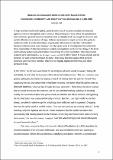Files in this item
General excommunications of unknown malefactors : conscience, community and investigations in England, c. 1150-1350
Item metadata
| dc.contributor.author | Hill, Felicity Gemma | |
| dc.contributor.editor | McKitterick, Rosamond | |
| dc.contributor.editor | Methuen, Charlotte | |
| dc.contributor.editor | Andrew Spicer | |
| dc.date.accessioned | 2019-07-25T12:30:01Z | |
| dc.date.available | 2019-07-25T12:30:01Z | |
| dc.date.issued | 2020-06 | |
| dc.identifier | 260291034 | |
| dc.identifier | 0dbd024f-fb87-426c-b628-6a9e675ffd9f | |
| dc.identifier | 85085477731 | |
| dc.identifier.citation | Hill , F G 2020 , General excommunications of unknown malefactors : conscience, community and investigations in England, c. 1150-1350 . in R McKitterick , C Methuen & A S (eds) , The Church and the Law . Studies in Church History , vol. 56 , Cambridge University Press , Cambridge , pp. 93-113 . https://doi.org/10.1017/stc.2019.6 | en |
| dc.identifier.isbn | 9781108839631 | |
| dc.identifier.issn | 0424-2084 | |
| dc.identifier.other | ORCID: /0000-0001-8435-7004/work/82179788 | |
| dc.identifier.uri | https://hdl.handle.net/10023/18164 | |
| dc.description.abstract | In high and late medieval England, general sentences of excommunication pronounced against unnamed wrongdoers were common. Responding to crimes whose perpetrators were unknown, general excommunications were a valuable tool that sought to discover and punish offenders in a number of ways. Solemn denunciations might convince the guilty to confess in order to avoid damnation, or persuade informants to volunteer information. General sentences were also, however, merely a precursor to investigations launched into those responsible. Public denunciations aided investigations conducted by clergy in the local community by publicizing and forcibly condemning the crime committed. Once discovered, suspects were summoned to the bishop's court and were either forced to make amends and do penance or excommunicated by name. This article therefore argues that general sentences were far more complex, effective and legally significant than they are often perceived to be. | |
| dc.format.extent | 229753 | |
| dc.language.iso | eng | |
| dc.publisher | Cambridge University Press | |
| dc.relation.ispartof | The Church and the Law | en |
| dc.relation.ispartofseries | Studies in Church History | en |
| dc.subject | BR Christianity | en |
| dc.subject | T-NDAS | en |
| dc.subject | BDC | en |
| dc.subject | R2C | en |
| dc.subject | SDG 16 - Peace, Justice and Strong Institutions | en |
| dc.subject.lcc | BR | en |
| dc.title | General excommunications of unknown malefactors : conscience, community and investigations in England, c. 1150-1350 | en |
| dc.type | Book item | en |
| dc.contributor.institution | University of St Andrews. School of History | en |
| dc.identifier.doi | https://doi.org/10.1017/stc.2019.6 |
This item appears in the following Collection(s)
Items in the St Andrews Research Repository are protected by copyright, with all rights reserved, unless otherwise indicated.

